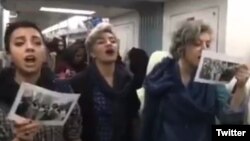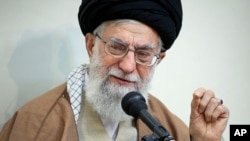A video of three Iranian women singing a famous feminist song on Tehran's subway March 8 to mark International Women's Day is going viral on social media and highlighted ongoing challenges to veiling and other discriminatory laws.
The women are not wearing the Islamic head scarf, known as the hijab, that is mandated for women in public under Iran's clerically dominated system.
The song, I'm A Woman, was created about a decade ago by a group of female activists who campaigned against discriminatory laws and came under state pressure for their efforts.
The song calls on women to join efforts to fight injustice and create "another world" of "equality."
The new clip has been shared widely on popular apps Telegram and Instagram and other social-media platforms where many have praised their courage and bravery.
They hold hands while singing and show what appears to be a photo of a previous protest by a group of women's rights activists.
Once they're done, one of the three calls on other women on the subway train to clap and honor themselves for "having lived and fought all their lives against all kinds of discrimination, violence, humiliation, and insults."
"You've paid a price, yet you've been the hero of your lives," the young woman says in the video while some of the passengers clap their hands.
"Happy [Women's] Day to all of you," she adds.
Women's Day arrests
The video was posted online amid reports that more than 50 people, some of them men, were detained by security forces in the Iranian capital on March 8 for attempting to gather outside the Labor Ministry to mark International Women's Day and urge greater respect for rights.
Dozens of women have risked arrest by carrying out public protests against the compulsory hijab that requires women in Iran to cover their hair and body in public.
The protesters have been standing on utility boxes without veils on the busy streets of Tehran and other cities, waving head scarves on sticks.
Some have been violently confronted by security forces and a number have been arrested.
They have fueled public debate about the hijab rule that became compulsory following the 1979 revolution, prompting rare statements on the topic from senior officials including the president and, most recently, Supreme Leader Ayatollah Ali Khamenei.
Those who are deemed to have violated the rule face harassment, fines, and prison terms.
Pushing dress code boundaries
Women have pushed the boundaries of the country's strict dress code in recent years by showing much of their hair and wearing short coats and tight pants. But the debate over the veil has flared up intermittently since the laws were tightened following the 1979 revolution.
Earlier this week, prosecutor Abbas Jafari Dolatabadi announced that one of the protesters was sentenced to two years in prison for attempting to "encourage corruption through the removal of the hijab in public."
Khamenei, who has the final say on religious and political affairs in Iran, broke his public silence on the veil protests this week to accuse the women in question of being "deceived" by foreign "enemies" funding the effort. He went on to acknowledge that "some of the elite are now questioning the mandatory hijab," suggesting that some "journalists, intellectuals, and clerics" were being led down "the path of the enemy."
The first of the recent hijab protests emerged amid an outbreak of street protests in December and January over economic woes and grievances against Iran's leadership, sparking a crackdown in which at least 22 people died and thousands were arrested.





